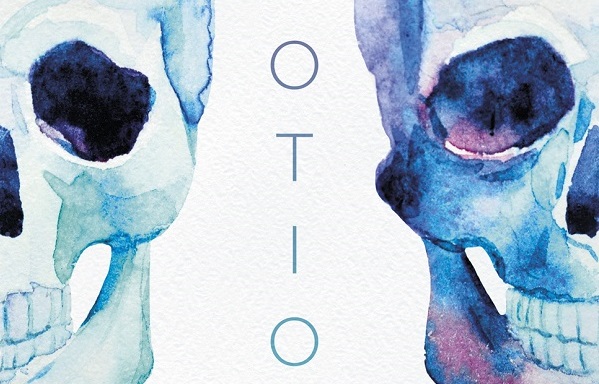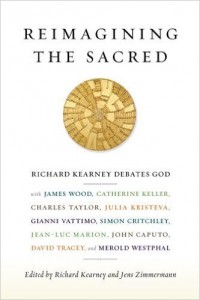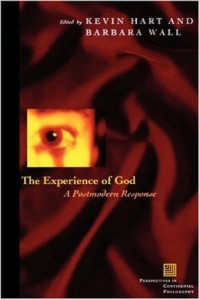
Religion in so far as it is a source of consolation is a hindrance to true faith; and in this sense atheism is a purification. I have to be an atheist with that part of myself which is not made for God. Among those in whom the supernatural part of themselves has not been awakened, the atheists are right and the believers wrong.
–Simone Weil, Gravity and Grace
Ros Barber’s provocative recently released novel Devotion is set sometime in the near future in the UK. Richard Dawkins has died a hero. New Atheism has triumphed so thoroughly that religious belief is on the verge of being declared a mental illness in need of drastic treatment. The action of the novel in part revolves around the pending case of 19 year-old murderer Rachel who claims to have a direct pipeline to God.
Rachel’s case is a possible stepping-stone toward certifying all believers as nutters who either need to be medicated, or put behind bars, or both. The book begins with a passage from her diary; no context, just bare text you’ll only learn to place later.
As you can see below the diary entry sounds insane in its characterization of atheists as complete assholes, different from believers who howl somewhere on the margins of the atheist Sodom and Gomorrah. However, ask yourself, are these words that different from the words God addressed to believers through the mouths of Jeremiah, Ezekiel, or Isaiah?
Atheists
Bone-houses. Flesh-renters. Reeling down the High Street, swear-gobbers, spit-flobbers. Dull-eyed beggar-dodgers, toddler-smackers, gum-droppers. Watch them. Oblivious breathing machines. Coke-swiggers and chip-munchers. Spouse-slaggers and wife-borers. Bus-chasers. Tube-crammers. Rattle-throwers left to cry all the way home at the knees of strap-hangers. Gummed up slow, or lurching too fast in their kid-scarers: nose-pickers, horn-thumpers. Night brings its own brain-wasters. Packet-rustlers and plotspoilers. Street-drinkers and ear-botherers. Late-bar minidresstotterers, naked-in-winters: rape-fodder pursued or steadied by beer-breathers, curry-spewers. Where is God in all this? God is a tame swear word. God is a lame joke. God is unfathomable: disaster-monger, famine-seeder. OMG, God is a teen-texted acronym. God is for nutters. For old ladies and nutters.
 However, things are a lot more mixed up, anatheistic, to use Richard Kearney neologism. In Reimagining the Sacred the Catholic philosopher Jean-Luc Marion totally messes up the dividing line between the believers and atheists:
However, things are a lot more mixed up, anatheistic, to use Richard Kearney neologism. In Reimagining the Sacred the Catholic philosopher Jean-Luc Marion totally messes up the dividing line between the believers and atheists:
We are all [both theists and atheists] anatheists now, to the extent that we share a common experience of no longer having a representation of God. When I discuss this with my nonbelieving colleagues, we all agree on this. So, when people say that after the end of representation of God there is no God they remain within metaphysics, which presupposes that there could be something that gives itself as representation. They miss the point.
I would argue that the experience of not having a conceptual understanding is not a condition unique to our post-Christian period after what Nietzsche called the Death-of-God. After all, St. Augustine (d. 425) was not the first to have a thought along the lines expressed in one of his sermons: “We are talking about God. What wonder is it that you do not understand? If you do understand, then it is not God.” Some of this even comes through also in the passage from Devotion above, because it conveys a sense that God is also inscrutable to Rachel.
The following thought experiment by Kevin Hart, from his essay in the collection The Experience of God, hammers God’s inscrutability to all home:
Imagine that someone knocks on your door and, when you open it, the man standing there says to you, ‘‘I have experienced God.’’ And imagine that you have walked down the hallway from the kitchen or the study with a remote in hand, a newfangled contraption with a special feature you have been dying to try out: a pause button that works with human beings. No sooner has that remarkable statement been uttered than you press the button: the man becomes a living statue, and you are left to ponder what has been said to you without having to respond. There is no question, then, of having to deal with someone who wishes to convert you, murder you, sell you a magazine, take your money, or engage you in fruitless and frustrating talk. The only thing you have to do is consider what has been said to you. If you like, you can look closely at this person, examining his face for signs of mania or substance abuse. He seems quite harmless. By now your heart has stopped thumping; and, as you take them in, those four common words must count as one of the most arresting sentences that has ever been said to you.
 He continues by noting that all the greatest mystics and confessors have always been skeptical of claims to unmediated experiences of God:
He continues by noting that all the greatest mystics and confessors have always been skeptical of claims to unmediated experiences of God:
Of course, you have heard the sentence many times before—or, at any rate, something very much like it—but never in such a direct and confronting manner. What did this person mean by saying that to you? Thinking back a few moments, you recall those four words were pronounced with out any particular emphasis; and it is that lack of stress, along with the poverty of context that you established simply by using that re- mote so quickly, that form the most unnerving aspect of the whole scene. Never perhaps has a sentence sounded so strange, and never perhaps has a sentence imposed itself so strongly on you. This strangeness is the spur to interpretation. First of all, as never before, the sentence strikes you as completely absurd. How can one pass from the finite to the infinite? To say that God can be experienced is to have assumed that the divine offers itself as a phenomenon, and this runs counter to everything you know about the proper usage of the word ‘‘God.’’ No sooner is this thought coming clear, though, than a dialectic begins. You think: all that is given to us comes through experience.
Thanks to the persistent theological critique of representing God, starting with the Old Testament’s trenchant critique of idolatry, the atheist in your midst might be closer to God if they don’t cling to idolatrous images of God. God is not an object of our experience, he is the condition for that very experience as the Creator and Sustainer of everything that is.
God is, to borrow one of Jean-Luc Marion’s favorite neologisms, a “saturated phenomenon.” He means to say with this phrase that God pervades everything so thoroughly that God overwhelms our senses, the secondary condition for any experiences we might have, and is therefore, paradoxically, invisible.
In other words, the atheists are, in a way, right about “What no eye has seen, what no ear has heard, and what no human mind has conceived.” The concept of God IS always dead; long live God! It’s as if, for all intents and purposes, God doesn’t exist, because God is not another object to be grasped.
We might instead say that God is the grasping of the universe (in his hands… He’s got the whole world in his hands).
Ain’t all this enough to drive you crazy?
BONUS, God isn’t the only “thing” we don’t know much about by definition, Marion adds the following in Reimagining the Sacred [I add it because it goes well with the featured photo for this post from the cover of Devotion]:
And it is the same for death as it is for birth. We think death is a terrible trial and tribulation. But what do we know? The fact is that we do not know anything about it. We simply don’t. We project in it all our fears, anxieties, anticipations, but we simply do not know.
Just to turn things upside down a bit, there are plenty of ways in which the New Atheists are wrong.
Please also consider making a donation to this blog through the donation button on the upper right side of its homepage.
Stay in touch! Like Cosmos the in Lost on Facebook:











